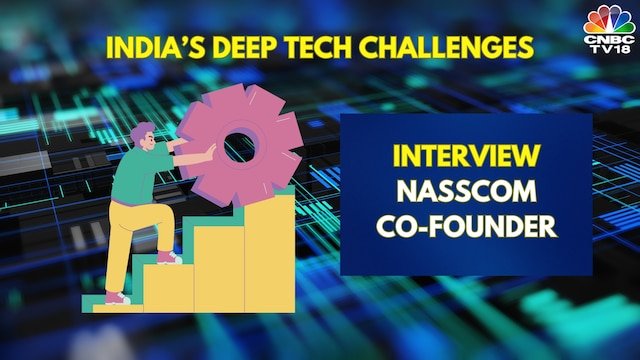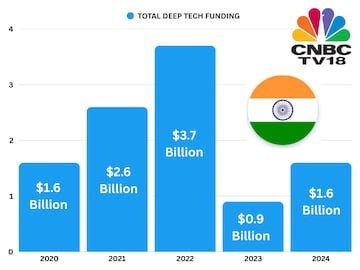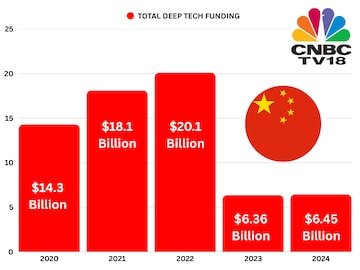
While India has earned global acclaim for its prowess in software production, led by the likes of Tata Consultancy Services (TCS) and Infosys, the country lags behind in emerging technologies. The explosion of artificial intelligence capabilities has led to a debate over the reasons why India has lagged behind countries like the US and China in the deep tech space.
There are at least three reasons — dearth of resources, a surplus in regulations, and lack of unity among startups — for the limited progress, according to Harish Mehta, the first chairperson and co-founder of NASSCOM, the lobby for the country’s tech industry.
What is deep tech? European Union has defined deep tech as the use of advanced and emerging technology solutions to address deep societal challenges. Technologies like AI, robotics, quantum computing and Internet of Things are some examples of deep tech.
Recently, the country’s industry minister Piyush Goyal raised a storm for criticising the startups for not keeping pace with their international peers. It was followed by backlash from the industry. Mehta’s view is nuanced. While he appreciated the nonpartisan support shown to the tech sector so far, he reiterated that more needs to be done to strengthen the ecosystem.
“Which investor will put money behind an entrepreneur whose intellectual property is not protected? Most of the good deep tech work is being funded by outsiders. So, when you don’t change that environment, don’t blame the entrepreneur,” he said in a conversation with CNBC-TV18.
Read more: India’s startup growth stifled by RBI’s ‘oppressive’ regulations, says Mohandas Pai
95% of the tech startups in India focussed in some form of deep tech in 2024, according to the latest NASSCOM-Zinnov report. Deep tech startups received $1.6 billion in funding last year, a 78% jump compared to 2023, the report added. 87% of all funding in 2024 went to startups working on AI solutions.
However, total tech funding in India dwarfs in comparison to China, which received $6.45 billion last year, according to Tracxn, a data platform. The sector received over $10 billion every year between 2020 and 2022.

Source: NASSCOM-Zinnov Indian Tech Start-up Landscape 2024
Mehta argued that the government must do more to strengthen research and development (R&D) in the tech sector. “The government has to visualise such (tech) projects. Most of the real R&D in the US has happened out of defence, and that translated into other things,” he said.
India has been a laggard in R&D funding. Annual allocation from governments, including states and the centre, was just $71 billion, according to the latest data from World Intellectual Property Organisation. On the other hand, the US spends nearly $900 billion while China spends about $500 billion for R&D work. “If there is no R&D, how do you expect deep tech to emerge?,” said Mehta, whose 2022 book ‘The Maverick Effect’ chronicles India’s IT sector boom.
There are regulatory challenges too. For instance, the US has classified India as a Tier-2 country, restricting export of graphics processing units (GPU), which is essential for large computing power. “The cap is less than 1,700 GPUs per company. Naturally, this impacts access to high-performance computing,” said Mehta.

Source: Tracxn
The other regulatory challenges include compliance with strict rules governing data privacy and security. NASSCOM has recommended startup-focused cells within ministries for faster approvals as well as more self-regulation in the field of emerging technologies.
India has one of the largest tech startup ecosystems in the world, with over 35,000 tech startups. Over 3,600 of them are into deep tech. However, Mehta argued that India’s tech startups are working in silos, which is affecting the whole ecosystem.
“Many startup founders today avoid deep interaction with the government, often due to mistrust or simply because they’re unaware of how a collaborative model can benefit them. It’s important to remember that if you don’t engage with the system, you can’t change it,” he added.
Content retrieved from: https://www.cnbctv18.com/technology/nasscom-cofounder-explains-the-challenges-for-deep-tech-startups-in-india-19588511.htm.






